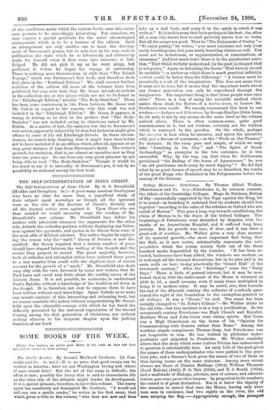SOME BOOKS OF THE WEEK.
[Under this headisii we notice such Books of the week as have not been reserved for review in eater forms.] The Gentle Reader. By Samuel McChord Crothers. (A. Con- stable and Co. Sc. net.)—It is no news that good essays can be written in America ; have we not Washington Irving and others of more recent date ? But the art of the essay is difficult; the effort is rare ; possibly the hurry that is said to characterise life on the other side of the Atlantic might hinder its development. It is a special pleasure, therefore, to have this volume. The hurry spirit has manifestly not deminated Mr. Crothers. "I would not call any one a gentle reader," he writes in his first essay, that which gives a title to the volume, "who does not now and then take up a dull book, and enjoy it in the spirit in which it was written." It is in this essay that he is perhaps at his best ; for, after all, a man who knows how to read probably knows how to write. But all the essays are good. Thus in "The Enjoyment of Poetry "— "To enjoy poetry," he writes, "you must renounce not only your easily besetting sins, but your easily besetting virtues as well. You must not be industrious, or argumentative, or conscientious, or strenuous." And how much truth there is in the paradoxical asser- tion," That which we fully understand [in the poet] is the part that is not poetry." Again, in defending the thesis "That history should be readable "—a matter on which there is much practical infidelity —what could be better than the following ? "A history must be essentially a work of the imagination. This does not mean that it must not be true, but it means that the important truth about any former generation can only be reproduced through the imagination. The important thing is that these people were once alive." There is a way of using the scientific method which makes them dead, the flowers of a hortus siecus, to borrow Mr. Crothers's own simile. We warmly recommend this book to our readers.—Ledgers and Literature, by George Knollys (John Lane, 3s. 6d. net), is not by any means on the same level as the volume noticed above. There is often common-sense, quite good common-sense in it, but not wisdom; certainly not the wisdom which is conveyed in the paradox. On the whole, perhaps the essayist is best when he narrates, and spices his narrative with just a flavour of sentiment,—in the "Week on the Thames," for instance. In the essay pure and simple, of which we may take "Lunching in the City" and "The Spirit of Greek Archaeology" as examples in the two extremes, he is less successful. Why, by the way, say that when Dr. Schliemann proclaimed "the finding of the bones of Agamemnon" he was "an old gentleman made crazy by much digging " ? He did find what by no great license of speech may be so described, the tombs of the great Kings who flourished in the Peloponnesus before the coming of the Dorians.














































 Previous page
Previous page